Conquerors of the "Kingdom of Ice". Russia celebrates the day of the polar explorer
Polar is a vocation. Among the people going on expeditions to the Arctic and Antarctic, there are representatives of very different professions - scientists - biologists and geologists, doctors, engineers, technicians, skilled workers and workers of auxiliary personnel. All of them are united by courage, lack of fear of life in the harsh conditions of the Arctic climate, with little or no communication with the outside world. To some extent, polar explorers can be compared with astronauts. Only polar explorers continue to explore and conquer areas of our planet that are difficult to access due to climatic conditions.
By the way, the official position of the Russian Ministry of Nature expands the category of "polar explorers" beyond the purely research composition of expeditions. In accordance with the point of view of specialists of the Ministry of Nature, polar explorers include not only Arctic and Antarctic researchers, but also employees of gas and oil producing companies working in the Far North, geologists, oceanologists, military personnel of the Russian army and fleetserving in the Arctic are simply residents of the Far North, including indigenous peoples. Thus, in Russia at least two million people can be classified as polar explorers. But in our material we will consider the polar explorers in their traditional sense - fearless researchers - pioneers of the Arctic and Antarctic latitudes.
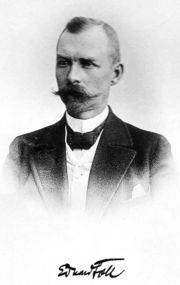 Russia has always been among the states making the greatest contribution to the development of the Arctic and Antarctic spaces. The names of many Russian researchers - polar explorers are connected with polar expeditions. Given that most of the Arctic was part of the sphere of influence of the Russian state, it is not surprising that numerous Arctic expeditions were equipped by Russia. At the end of the XIX century, the Arctic fleet was created in the Russian Empire. The initiative to create it belongs to Vice-Admiral Stepan Makarov. It was he who proposed to start the construction of special ships capable of moving in the Arctic ice and clearing the way for the remaining ships from ice floes. The need for accelerated development of Arctic research was dictated by the need to develop the Northern Sea Route. In 1899, the world's first icebreaker "Yermak" was built. In 1900, the first Russian polar expedition was equipped, which became the first Arctic expedition in the waters of the Arctic Ocean, which was carried out on its own ship. The expedition was led by Baron Eduard V. Toll (1858-1902) - one of the first Russian polar researchers, a famous traveler and biologist, who visited North Africa to study the local flora and fauna before his enthusiasm for polar studies (see photo).
Russia has always been among the states making the greatest contribution to the development of the Arctic and Antarctic spaces. The names of many Russian researchers - polar explorers are connected with polar expeditions. Given that most of the Arctic was part of the sphere of influence of the Russian state, it is not surprising that numerous Arctic expeditions were equipped by Russia. At the end of the XIX century, the Arctic fleet was created in the Russian Empire. The initiative to create it belongs to Vice-Admiral Stepan Makarov. It was he who proposed to start the construction of special ships capable of moving in the Arctic ice and clearing the way for the remaining ships from ice floes. The need for accelerated development of Arctic research was dictated by the need to develop the Northern Sea Route. In 1899, the world's first icebreaker "Yermak" was built. In 1900, the first Russian polar expedition was equipped, which became the first Arctic expedition in the waters of the Arctic Ocean, which was carried out on its own ship. The expedition was led by Baron Eduard V. Toll (1858-1902) - one of the first Russian polar researchers, a famous traveler and biologist, who visited North Africa to study the local flora and fauna before his enthusiasm for polar studies (see photo). The closest assistant to Eduard Toll was Lieutenant Alexander V. Kolchak (1874-1920) - a young naval officer who served in the battleship Petropavlovsk. He was interested in polar research and was assigned to Toll's expedition as the second magnetologist and leader of hydrological research. Subsequently, Alexander Kolchak became an admiral and led the White movement in Siberia, for which he was shot. Kolchak’s participation in Toll’s polar expedition helped her story in Soviet times seriously distorted. It was not profitable for the Soviet authorities to represent Kolchak not only as a dictator of Siberia, but also as an outstanding researcher, since this would require a reappraisal of the role of his personality in Russian history and at least partial rehabilitation of the admiral. Therefore, the role of Kolchak in polar studies tried to hush up.
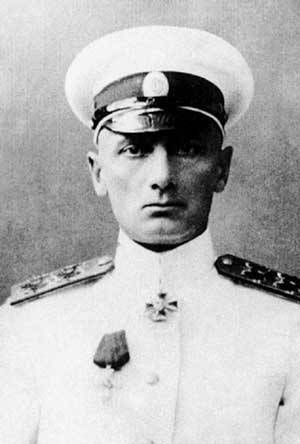
The purpose of the expedition Toll was to study part of the Arctic Ocean, located north of the New Siberian Islands and the search for Sannikov Land. In addition, during the expedition, sea currents in the Kara and East Siberian seas were investigated, and geological surveys were conducted on the Novosibirsk islands. A huge empirical material was collected on meteorology, oceanography, glaciology, physical geography, geology, botany, paleontology, and ethnography of northern peoples. In fact, it was the Russian polar expedition of Baron Toll that laid the foundation for the further integrated study of the Arctic seas and sushi. Bennett 5 August Toll's party reached the island of Bennett. However, the schooner "Dawn", which two months after the departure of the researchers, was supposed to take them from the island, was seriously damaged due to difficult ice conditions and could not continue further navigation. In September, 1902, the vessel left for Tiksi Bay. Four members of Toll's group remained on Bennett Island. In 3, the new polar expedition, commanded by Lieutenant Kolchak, went in search of Toll. But four polar explorers could not be found either alive or dead.
The rescue expedition of Lieutenant Alexander Kolchak is also inscribed in golden letters in the history of Russian polar research in the Arctic. The expedition members made a unique seven-month hike with an arctic 90-day luge-boat transition along the route: the village of Ajergaydah - Kotelny - Faddeevsky - New Siberia - Bennett. In addition to searching for Toll and his satellites, which were not crowned with success, Kolchak's polar explorers refined the outlines of the coastline, studied the ice formation in the area under study. For carrying out this expedition, Kolchak bothered to be universally recognized, and famous scientists, including PS. Semenov Tien-Shansky, noted the outstanding contribution of the lieutenant in the Russian geographical science.
Of course, one of the most famous polar researchers of the Russian Empire, who gave his own life in the name of developing the unexplored lands and seas of the Arctic, can be called George Yakovlevich Sedov (1877-1914). Sedov - a man of amazing fate, "who made himself."
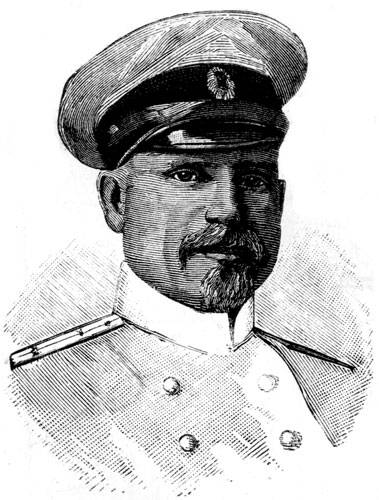 Coming from the family of the peasant Yakov Sedov, who was engaged in fishing, he grew up in poverty and even in his teens was even sent to the farm laborers to his wealthy neighbor. Only in 14 years he entered the parish school, where he studied for three years. Then Georgy Sedov worked as a shop assistant for a short time, and then left his father's house and entered as a sailor on the ship "Trud". Then he was able to enter the “Nautical Classes” named after Count Kotzebue in Rostov-on-Don, in the summer he sailed as a helmsman, and then as the second mate on the ship “Trud”. After three years of study in Nautical classes, in 1899, Sedov received a diploma in navigating coasting. So he became a naval officer - though still a merchant fleet.
Coming from the family of the peasant Yakov Sedov, who was engaged in fishing, he grew up in poverty and even in his teens was even sent to the farm laborers to his wealthy neighbor. Only in 14 years he entered the parish school, where he studied for three years. Then Georgy Sedov worked as a shop assistant for a short time, and then left his father's house and entered as a sailor on the ship "Trud". Then he was able to enter the “Nautical Classes” named after Count Kotzebue in Rostov-on-Don, in the summer he sailed as a helmsman, and then as the second mate on the ship “Trud”. After three years of study in Nautical classes, in 1899, Sedov received a diploma in navigating coasting. So he became a naval officer - though still a merchant fleet. However, the young navigator dreamed of research activities, which required the transition to the navy. In 1901, he achieved the rank of ensign of stock, then externally passed the exams for the course of the Marine Corps and received the rank of lieutenant of stock. In the spring of 1902, Sedov was enlisted in active service for the Admiralty in the General Hydrographic Office, in the same year he was sent on his first hydrographic expedition to the Arctic Ocean. From this time until the tragic death in 12 years, the life of George Yakovlevich Sedov was associated with marine research, not only in the Arctic, but also in the Caspian Sea. During the Russo-Japanese War 1904-1905, Sedov had to take a break from research. As a naval officer, he was sent to the Siberian military flotilla and was appointed commander of the destroyer number 48, who served in the Amur Bay.
In 1912, George Sedov decided to reach the North Pole. First of all, he wanted to overtake the Norwegian Roald Amundsen, and besides - to present the 300 anniversary of the House of Romanov, which was to be celebrated in 1913, to a great gift to Emperor Nicholas II - to hoist the Russian flag at the North Pole. However, the commission of the Main Hydrographic Office rejected the plan of Sedov, so the expedition could not count on state assistance. Its funding came from private donations, with the Emperor Nicholas II himself donating 10 thousand rubles. 27 August 1912 The sailing-steam schooner "Holy Great Martyr Fock" left Arkhangelsk. The members of the expedition of Sedov spent two winterings in the Arctic. 2 February 1914, a patient with scurvy Sedov, along with two sailors G. I. Linnik and A. I. Pustoshny on three dog sleds (having only 20 dogs), went hiking to the North Pole. A week later, Sedov could not go and ordered to tie himself to the narts. 20 February Georgy Yakovlevich Sedov died. The sailors who accompanied him buried Sedov on Rudolph Island, wrapping the body of a brave explorer in two bags and hoisting a cross from the skis on the grave. One of the sled dogs, Fram, refused to return with the sailors and stayed at the tomb of Sedov. In contrast to the polar explorers Toll and Kolchak, the image of Sedov was actively popularized during the Soviet era, settlements, city streets, a nautical school in Rostov-on-Don were named after the researcher, and a large number of children's, youth and popular science literature about Sedov was published. his life and expedition.
Serious studies of the Arctic latitudes were interrupted by the First World War and the revolutionary events that followed in Russia, but in the Soviet Union polar research reached a new level. Actually, the date chosen as the Day of the polar explorer was not established by chance - it is associated with Soviet research at the North Pole. 21 May 1937 launched the first research expedition of the North Pole polar drifting station (SP-1).
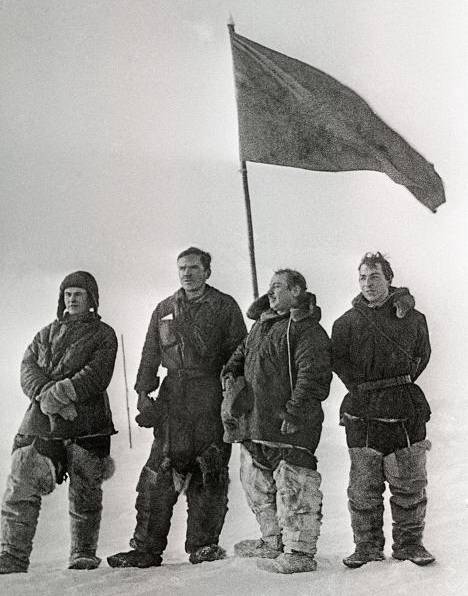
The creation of this station was authorized by a decision of the Political Bureau of the Central Committee of the CPSU (B.) In February 1936. Ivan Papanin was appointed head of the station, and Academician Otto Schmidt was the head of the first Soviet scientific expedition. The expedition included a geophysicist-meteorologist Yevgeny Fedorov, an oceanologist Peter Shirshov, a radio operator Ernst Krenkel. The flight detachment that delivered cargo and equipment to the station was commanded by Mikhail Vodopyanov. 21 May 1937 A Soviet expedition plane flew from Rudolph Island to a drifting ice floe in 20 km. from the North Pole. However, due to the delay of other aircraft, only 6 June 1937 was the grand opening of the station "North Pole - 1". The four pioneers of the polar explorers were later called “Papanins” - by the name of the station's leader, Ivan Papanin. 19 February 1938 of the year Papaninians were evacuated, because the country's leadership was worried about their safety - the life of polar explorers was repeatedly threatened due to fractures of ice floes. All members of the expedition Papanin were awarded the high ranks of Heroes of the Soviet Union.
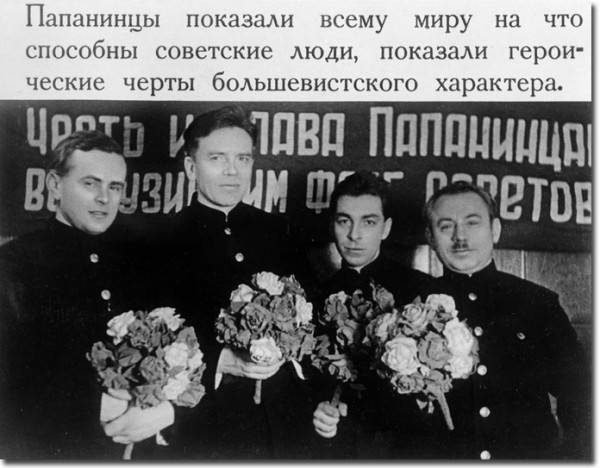
But only in the 2013 year, already in post-Soviet Russia, the Polar Explorers Day was introduced. Artur Nikolaevich Chilingarov, one of the most famous and oldest Russian polar explorers, initiated the creation of a new holiday. Chilingarov is one of four Russians who were awarded at the same time the high titles of Hero of the Soviet Union and Hero of the Russian Federation. Arthur Nikolaevich Chilingarov received the title of Hero of the Soviet Union in 1986 for the “exemplary accomplishment of the assignment to free the research ship Mikhail Somov from the ice of the Antarctic, the skillful leadership of the courts during rescue operations and the period of drift and the courage and heroism shown.” In 2008, he was awarded the title Hero of Russia - “for courage and heroism shown in extreme conditions, and the successful conduct of the High-latitude Arctic deep-water expedition”. During this expedition, carried out in 2007, for the first time in history, people reached the bottom at the North Pole. 2 August 2007. Two Mir units were submerged. Pilot - Doctor of Technical Sciences Anatoly Sagalevich, Doctor of Geographical Sciences and President of the Russian Association of Polar Explorers Hero of the Soviet Union Artur Chilingarov, Deputy of the State Duma of the Russian Federation Vladimir Gruzdev were in the crew of the Mir-1, which was the first to plunge into depth and reached the bottom. The crew of the Mir-2 consisted of a Russian pilot — engineer Evgeny Chernyaev, a Swedish polar explorer Frederick Paulsen and an Australian citizen Mike McDowell — head of the travel company Deep Ocean Expeditions.
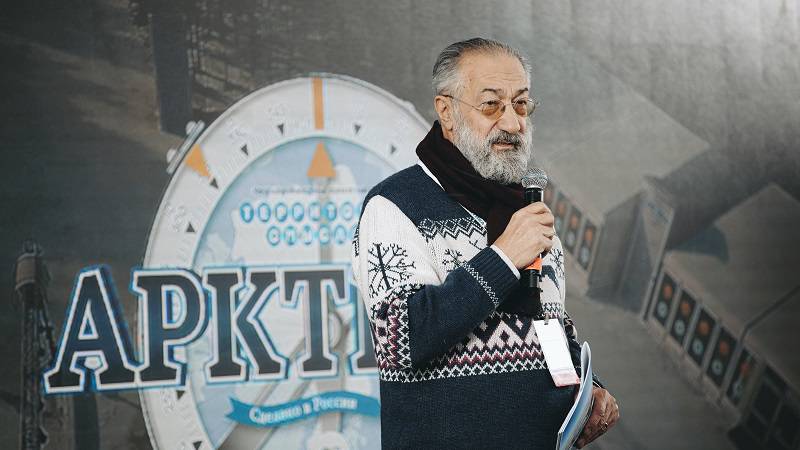
Today a representative of one of the professions in demand in the Arctic or Antarctic may become a polar explorer. The head of the RAE, Valery Lukin, in one of his interviews emphasized that a polar explorer is not a profession, but a way of life. To become a polar explorer, one must have a good knowledge of his profession and be able to realize his skills and qualifications in the Arctic and Antarctic conditions. Polar explorers are sailors and pilots, meteorologists and hydrologists, oceanologists and zoologists, doctors and electricians, system administrators and drivers, representatives of many other professions. Of course, physical health is very important for polar explorers. But the most important thing is courage, decisiveness and ability to interact in a small team, without conflicting with fellow polar explorers and without disorganizing his work.
Information